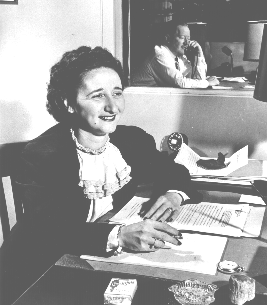Page 1
[Begin Tape 1, Side A]
Ingersoll: Edythe, we want to concentrate today on your work beginning the newsroom for WOR. But before that, let's talk just a little bit about your jobs before that and your family life before you began your broadcasting career. First, where did you live? Where did you grow up?
Meserand: We lived in Philadelphia, my mother [Gaetana], father [Albert Meserand], and sister [Mary], who is eight years older than I am. We had a very quiet life. As you know, Philadelphia is more southern than some southern cities, and we had a darling little house, row house, and it was a very happy childhood. I went to schools there, and then when I was about—well, I was graduated from what would be elementary school very young apparently, because I graduated from high school at age sixteen. That was in New York, because we moved to a house outside of Jamaica, New York, the old Frederick Estate.
We lived there for a number of years and then moved up to an area known as Morris Park. That was in the Bronx and it was right off the Pelham Parkway area. It was sort of country, and we had a house there. It was while I was there that I went into the job market because of certain reverses in our financial status. I could not attend college. I did not attend any formal college.
I did go to a business college so that I could enter the work market, and my first job was with a French organization known as Pathex. It was a subsidiary of Pathé News. Are you familiar with that?
Ingersoll: Pathé News.
Meserand: We had newsreels featured in the movie houses in those days. The vice president of Pathé was here in New York City to introduce and market a home movie camera and projector, and they had offices on Forty-Third Street in New York, right opposite Stern's Department Store. My job was to condense and write a résumé of the films that they had on eight-millimeter film for use in the home, like the "Our Gang" comedies and other films that they had purchased.
The man in charge of this was a Frenchman by the name of Jacques Borst. It was B-O-R-S-T, but it was pronounced like an E [Berst]. He was a charming gentleman, very rotund, and arrived in New York with his gold telephone and manicured hands. His hands really fascinated me because I had never known anybody who had manicured nails of the male sex. [Laughter.] He was very intrigued with my writing, apparently, because he always said to me, "Edeet, you are going to day-ve-lup." And it took me a little while to figure out what he was saying, but he thought that I would develop into something, apparently.
As far as family was concerned, we were a family-oriented family, if you know what I mean. It was the hub of all activity. My father loved music and, consequently, we were exposed to the opera, the concerts, and particularly the band concerts in Philadelphia, which he loved. I can remember Mother packing a picnic lunch and dinner, and we would start out very early on Sunday mornings by trolley car. We had no car. No one had cars in those days, except the very

